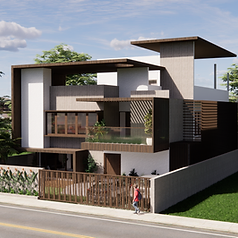Contact : +91 963258756
A real estate architect plays a pivotal role in shaping the urban landscape, designing functional and aesthetically pleasing spaces that cater to both residential and commercial real estate. In the rapidly evolving real estate market, architects bring creativity, technical expertise, and a deep understanding of building codes and regulations to every project. Their work is essential for optimizing land use, ensuring sustainability, and enhancing property value, making them a crucial asset for developers, investors, and homeowners alike.
Importance of a Real Estate Architect
In real estate development, a skilled architect is key to turning a vision into reality. Whether it's designing luxury homes, commercial complexes, or multi-family residences, architects create designs that reflect both the developer’s goals and the market demand. They ensure that the property is not only visually appealing but also functional, sustainable, and in line with local zoning laws and environmental regulations.
Real estate architects help clients maximize land use, improving the property's efficiency and profitability. They take into account factors like natural lighting, ventilation, and energy efficiency, which enhance a building’s long-term value. Moreover, their ability to merge modern design trends with timeless architectural principles ensures that properties stand out in a competitive market.
The Role of Sustainability in Real Estate Architecture
In recent years, sustainability has become a core aspect of real estate architecture. Architects are now focusing on designing eco-friendly buildings that reduce carbon footprints and promote energy efficiency. They incorporate sustainable materials, implement green building technologies, and design spaces that support renewable energy sources, such as solar panels. Sustainable design is not only beneficial for the environment but also adds significant value to properties, as many buyers and investors prefer eco-conscious living spaces.
Key Responsibilities of a Real Estate Architect
-
Design and Planning: The architect is responsible for conceptualizing the design, creating blueprints, and planning the entire layout of the property. This includes selecting materials, designing the structure, and ensuring optimal space utilization.
-
Budget Management: Architects work closely with developers to manage costs while ensuring the quality of the project. They provide solutions that meet budget constraints without compromising on design or structural integrity.
-
Regulatory Compliance: Architects must ensure that the design complies with all building codes, safety regulations, and local zoning laws. This involves submitting plans to regulatory bodies and making necessary adjustments to meet legal standards.
-
Collaboration with Stakeholders: A real estate architect works with a wide range of stakeholders, including engineers, contractors, interior designers, and urban planners. This collaboration ensures that all aspects of the project are aligned, from structural safety to interior aesthetics.
-
Project Management: Beyond design, architects oversee the construction process, ensuring that the project stays on track in terms of timelines and budgets. They monitor the progress and make adjustments as needed to address unforeseen challenges.
Real Estate Architect and Market Trends
In the current market, the demand for innovative and flexible real estate solutions is rising. Buyers and renters are looking for spaces that offer both comfort and modern amenities. Architects are responding by designing open-concept spaces, integrating smart home technology, and creating multi-use spaces that cater to a variety of needs. In commercial real estate, the focus is on creating flexible workspaces that accommodate remote and hybrid working models.
Conclusion
A real estate architect is integral to the success of any property development project. From designing sustainable, market-relevant spaces to ensuring regulatory compliance and cost efficiency, architects provide the expertise needed to create high-quality real estate. As the real estate market continues to evolve, architects will play a crucial role in shaping the future of urban and suburban environments.
.jpg)
